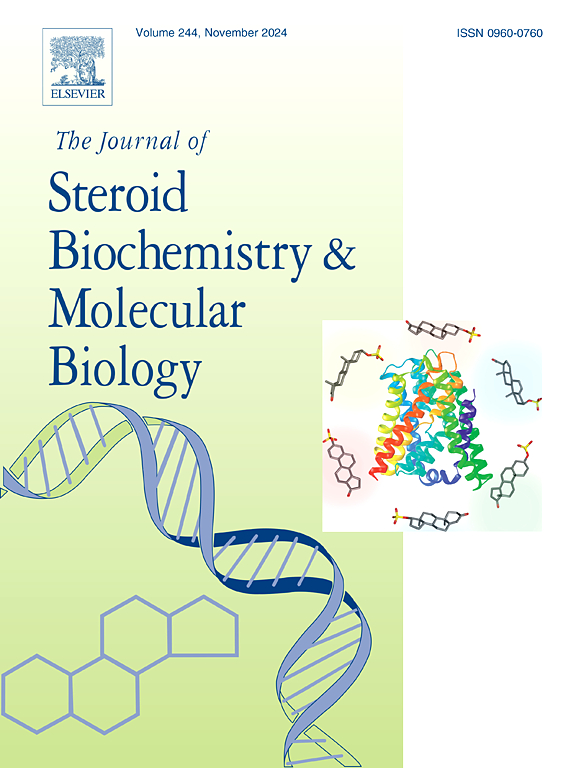Oxysterols in tumor immune microenvironment (TIME)
IF 2.7
2区 生物学
Q3 BIOCHEMISTRY & MOLECULAR BIOLOGY
Journal of Steroid Biochemistry and Molecular Biology
Pub Date : 2024-11-16
DOI:10.1016/j.jsbmb.2024.106634
引用次数: 0
Abstract
Oxysterols are compounds generated through oxidative reactions involving cholesterol and other steroid molecules. They play a crucial role in the tumor immune microenvironment by interacting with molecules such as the cell membrane receptor EBI2 and nuclear receptors like LXR and PXR. This interaction regulates immune cell signaling pathways, affecting proliferation, apoptosis, migration, and invasion in tumor-related processes. Activating these receptors alters the function and behavior of immune cells—such as macrophages, T cells, and dendritic cells—within the tumor microenvironment, thus promoting or inhibiting tumor development. Certain oxidized steroids can increase both the number and activation of infiltrating T cells, synergizing with anti-PD-1 to enhance anti-tumor efficacy. An in-depth study of the biological mechanisms of oxidized sterols will not only enhance our understanding of the complexity of the tumor immune microenvironment but may also reveal new therapeutic targets, providing innovative strategies for tumor immunotherapy.
肿瘤免疫微环境中的氧基甾醇(TIME)。
氧基固醇是胆固醇和其他类固醇分子发生氧化反应生成的化合物。它们与细胞膜受体 EBI2 和核受体 LXR 和 PXR 等分子相互作用,在肿瘤免疫微环境中发挥着重要作用。这种相互作用可调节免疫细胞信号通路,影响肿瘤相关过程中的增殖、凋亡、迁移和侵袭。激活这些受体会改变肿瘤微环境中免疫细胞(如巨噬细胞、T 细胞和树突状细胞)的功能和行为,从而促进或抑制肿瘤的发展。某些氧化类固醇可以增加浸润T细胞的数量和活化,与抗PD-1协同增强抗肿瘤疗效。深入研究氧化固醇的生物学机制不仅能加深我们对肿瘤免疫微环境复杂性的理解,还能发现新的治疗靶点,为肿瘤免疫疗法提供创新策略。
本文章由计算机程序翻译,如有差异,请以英文原文为准。
求助全文
约1分钟内获得全文
求助全文
来源期刊
CiteScore
8.60
自引率
2.40%
发文量
113
审稿时长
46 days
期刊介绍:
The Journal of Steroid Biochemistry and Molecular Biology is devoted to new experimental and theoretical developments in areas related to steroids including vitamin D, lipids and their metabolomics. The Journal publishes a variety of contributions, including original articles, general and focused reviews, and rapid communications (brief articles of particular interest and clear novelty). Selected cutting-edge topics will be addressed in Special Issues managed by Guest Editors. Special Issues will contain both commissioned reviews and original research papers to provide comprehensive coverage of specific topics, and all submissions will undergo rigorous peer-review prior to publication.

 求助内容:
求助内容: 应助结果提醒方式:
应助结果提醒方式:


